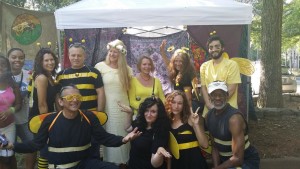Atlanta Bee Advocates Protest Monsanto on National Day of Action
 (APN) ATLANTA — On National Honey Bee Day, August 15, 2015, over 200 cities participated in events called Bee Against Monsanto. In Atlanta, the event was held at Freedom Farmer’s Market at the Carter Center to educate the public about the importance of bees and the devastation of bee colony collapse.
(APN) ATLANTA — On National Honey Bee Day, August 15, 2015, over 200 cities participated in events called Bee Against Monsanto. In Atlanta, the event was held at Freedom Farmer’s Market at the Carter Center to educate the public about the importance of bees and the devastation of bee colony collapse.
Bees are one of myriad animals–including birds, bats, beetles and butterflies–called pollinators. Pollinators transfer pollen and seeds from one flower or plant to another, fertilizing the plant so it can grow and produce food.
Bees pollinate a majority of the world’s food and without them there would not be very many fruits or vegetables for us to eat.
There are three kinds of honey bees: the Queen, worker, and drone. The Queen can lay about 1,500 eggs per day; the workers are all female and do all the work for the hive. The drones are the male bees and they fly off to find another queen and start another hive.
Right to Know Right to Grow planned a fully-immersive experience that was educational and entertaining for visitors at the Farmer’s Market.
“We have something for everyone from Mother Nature’s tent for children with songs, games, and storytelling… We have bee facts posted around the market, a literature table, and a poster board about the dangers of genetically modified organisms or GMO’s,” Ashland Kayne, with Right to Know Right to Grow, one of the organizers of the day’s events, told Atlanta Progressive News
“The message we are trying to get across is that bees are integral to life everywhere,” Kayne said.
One of the more entertaining performances was a three-time Tae Kwon Do world champion, dressed as a bee, taking on Monsanto Man, who had spraying insecticide on the other bees.
The Tae Kwon Do Bee kicked Monsanto Man to the ground, and the other bees swarmed and stung him to death to the delight of the crowd.
“There are multiple causes for the bee collapse. We think the number one cause is glyphosate, which is the main ingredient in Monsanto’s Roundup,” Ron Atkins, with Right to Know Right to Grow, said.
Bee populations have declined from six million hives in 1947 to 2.4 million hives in 2008, a sixty percent decline, according to the U.S. Agriculture Statistics.
“Monsanto was about to lose their patent on Roundup. In order to maintain their corner of the market, they came up with the idea to genetically alter the seeds… The seeds were designed to withstand the repeated spraying of the glyphosate or Roundup,” Atkins said.
GMO’s are the result of a process that involves inserting the genes from viruses and bacteria into the DNA of other species like soybeans and corn to create a herbicide-resistant and insect-resistant food product.
“It seems to be a dominant component in Monsanto’s mission to control the world’s food supply. Any one company or industry that controls the food supply, is not a wise venture,” Atkins said.
When Roundup and other pesticides are in the environment, bees bring the pesticide-laden pollen and nectar back to the hive; and a few months later the bees fall prey to deadly infections and the bee hive collapses.
Insecticide products like Roundup are also killing butterflies and birds.
“People don’t understand the connection in what they are doing when they spray Roundup to kill a weed. We’ve got to grow our own [organic] vegetables and fruits, so these pollinators can hang out,” Sandi Goldi, Right to Know Right to Grow, said.
Susan Ford Flaherty, who played Mother Nature at the event, is the daughter of a beekeeper.
She told an amazing story of what her father’s bees did at his gravesite.
“After his death, all of his bees swarmed and covered his grave with a thick blanket of buzzing bees,” Flaherty told APN.
“I have since learned that when beekeepers pass, that often their bees will swarm on the grave. Old-timers will take a dark cloth and put it over the hives to keep the bees from swarming. How do they know their beloved beekeeper has passed away? That is an interesting thing to contemplate,” Flaherty said.
Another interesting bee fact is that honey, which is not pasteurized, has its own ecosystem, including live enzymes that continually replenish themselves, so the bee honey will stay good for thousands of years.
Honey has natural preservatives and bacteria can’t grow in it. It was found in the tombs in Egypt and it was still edible.
(END/2015)